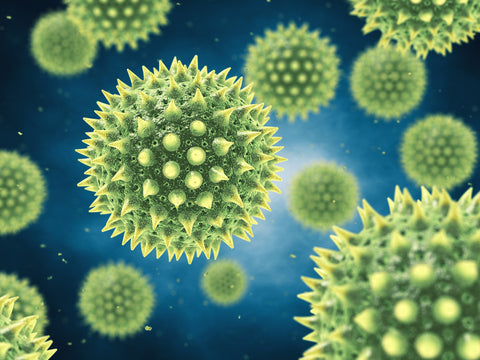If you’re one of over 50 million people in the United States who suffers from some sort of nasal allergy, you know how miserable a hot windy summer day can be. Heck, you know how miserable a windy cool summer day can be.
It’s estimated that nearly 30 percent of all adults and almost 40 percent of children suffer from some sort of allergy. Those range from the annoying sniffles when flowers bloom, to life-threatening allergy-induced asthma attacks. So, for those of us who do suffer from allergies, we’ve learned to take steps to protect ourselves.
First, we know that we have to have some sort of air purifier in our home. For some of us, it’s an actual air purifier that filters out all the bits and bobs that make us sneeze and cough. For others, we vacuum a lot with a HEPA rated vacuum to do the same. Others rely on their ventilation system to remove pet dander and pollen from their air. Of course in all of these situations, we know to change out the filters on a timely basis and ensure that the rest of the machines are clean as well.
Still, despite all of our best efforts, occasionally we still get a case of the coughing, twitchy-eyed, sneezing, gasping, or some other form of allergic attack. And in the aftermath of the sneezing fit, we ask ourselves one question at some point. Why does our body do this to us? What causes these sneezes, watery eyes, runny noses, and the seemingly only reason that Kleenex stock stays strong?
Allergies – The Misunderstood Invasion

An allergic reaction is basically a misunderstanding between your body’s natural defenses and the incoming foreign particle. Your immune system sees a mote of pollen, and rather than do nothing, it sounds the alarm. This reaction takes place whenever your body encounters anything like this – it could be peanut butter, or a medicine, or even plain dust.
Your body tries to protect you against this heinous fleck of dust, fearing for your very life. In doing so, it rallies the troops, triggering the release of a very specific antibody: the Immunoglobulin E (IgE) antibody. IgE isn’t understood very well by immunologists in what precisely it does besides make allergy sufferers miserable. But there has been speculation that the antibody is important for detection of cancers and in fighting specific worm parasites. This includes hookworms that infest the lungs and specific gut parasites. So the next time you sneeze from a whiff of your cat, just remember it could be worse.
When this antibody is released without the presence of a hookworm or a gut parasite, it attaches to a specific type of white blood cell called a mast cell. This mast cell is very important part of the immune system, normally involved in the healing of wounds and protection against external pathogens. When it comes to your allergies, however, it also serves an important purpose. Once you’ve been exposed to something you’re allergic to, such as dust or cat dander, the mast cell becomes seeded with the IgE antibody.
So, the second time that you run into your allergen, your white blood cells are already primed to overreact. And overreact they do, releasing histamines everywhere. And it’s the histamines that cause the problems. When they get into your nose and throat, they cause runny noses and watery eyes. They also cause sneezing, and, they get the blood vessels in your sinuses to dilate so more blood can come to the site. The enlargement of the blood vessels means that your sinuses get congested, making for a miserable set of allergic reactions to pollen or dust, or whatever your allergen has to be.
Stopping The Histamine Over-Reaction

Stopping the allergic reaction requires one of two things. You either remove the allergen from the environment (or remove yourself from the allergen), or you stop the production of histamine. You can stop your body from producing histamine in one of two ways – over the counter medication, like Claritin, or Zyrtec, or you get allergy shots that get your body used to your specific allergen.
Allergy shots are a form of immunotherapy, where you are injected with the very thing you’re allergic to in specific doses. Eventually, your body begins to build up a tolerance to whatever is driving your immune system crazy, so you don’t go into a fit of sneezing every time you pass by a flowering dogwood. The drawback to this is that you have to get a shot twice a week for three to six months, and then on shot every two to four weeks. If you don’t like needles, this may not be the treatment option for you.
Allergy medication is a tried and proven method of relieving allergy symptoms. Still, people argue that stopping the production of histamines can have adverse effects on other parts of your life. Histamines play an important role in staying awake (hence the balloon-head effect of many older antihistamine medications), and also stimulate digestion.
Another way to reduce the effects of allergies is by removing the allergen from your home. This means staying on top of cleaning even more than you already do. Change your filters regularly, and consider upgrading them. If you have a central HVAC system, consider upgrading your box filters to a higher MERV rating. On your air purifier, ensure that your HEPA filters are always clean. If you have washable and reusable filters, keep them clean and dry before every vacuuming.
Allergies can be a misery to deal with, but understanding where they come from and why your body reacts the way it does will help you treat them. With a few simple adjustments, you can control your allergies instead of the other way around.


